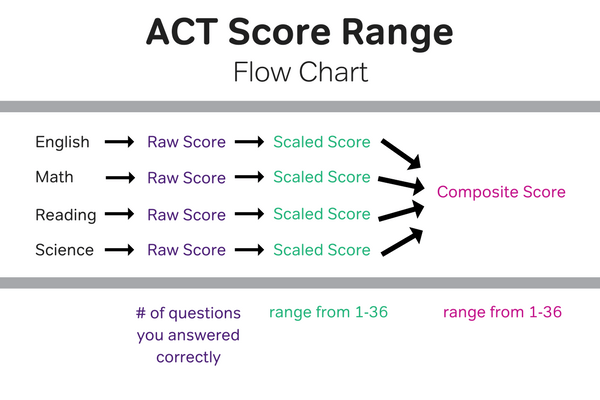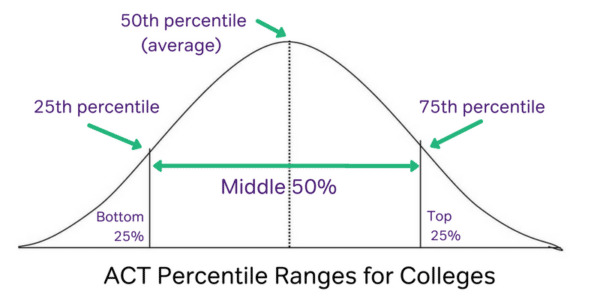Good ACT scores are the key to getting into the college of your dreams! But what is a good score? For most students, scoring above average, 21 or higher, is a good score. For those applying to elite colleges, scores in the 93rd percentile (30+) or even the 98th percentile (33+) are good scores. But that’s the short answer… there is more to it than that of course.

Click the links below to go straight to that section, or keep reading to get everything you need to know ACT scores!
- How are ACT Scores Calculated?
- What is the Highest ACT Score?
- What is a Good ACT Score?
- ACT Scores for the Top 100 U.S. Universities
- How ACT Scores Can Help You Win Scholarships
- Should I Cancel My ACT Score if I Get a Bad Score?
How are ACT Scores Calculated?
The ACT test score range is between 1 and 36. There are two types of scores that fall in this range: your section scores and your composite score.
Section Scores
The ACT exam comprises four sections:
The score on each section is calculated by converting the raw score—the number of questions you answered correctly in a given section—to a scaled score in that 1-36 range. (There are no penalties for questions with an incorrect answer).
If you’re thinking “aw man, do I need to know a formula to figure out my practice ACT results??” — never fear! We actually have this handy dandy score calculator where you can plug in your raw scores to figure out your section scores. You can also check out our ACT Raw Score Conversation Chart for a sense of how many questions you need to answer correctly to get a certain scaled score.
Composite Scores
To make your composite, or overall, score, the test maker then averages your four scores on all sections. This is also scored using the 1-36 ACT scale.

So what is a good ACT composite score? Many factors will help you determine what a good ACT composite score is for you. But before we get into that, know that the composite score is not the only score that matters! The ACT score report will provide you even more information about your test-taking experience in the form of subscores.
Subscores
The Reading, Writing, and Math sections also have categories with their own score ranges, as noted in the table below:
| Section | Overall Score Range | Sub-Score Breakdown |
|---|---|---|
| English | 1-36 | Usage/Mechanics (1-18) Rhetorical Skills (1-18) Essay (2-12) |
| Math | 1-36 | Pre-Algebra/Elementary Algebra (1-18) Algebra/Coordinate Geometry (1-18) Plane Geometry/Trigonometry (1-18) |
| Reading | 1-36 | Social Sciences/Sciences (1-18) Arts/Literature (1-18) |
| Science | 1-36 | No sub-scores on the Science test! |
Percentiles
Finally, last but definitely not least, you’ll see your percentile. Or, rather, percentiles.
Your ACT percentiles compare your scores to the scores of other test-takers. In your score report, you’ll be able to see where you stand both in terms of your composite score and your section scores.
If you scored in the 90th percentile, for example, you scored better than 90% (or 90 out of every 100) test-takers. If you scored in the 50th percentile, you scored better than half of your peers.
What is the Highest ACT Score?
Seeing as the ACT score range is between 1 and 36, naturally, the highest score that one can receive on the ACT is a 36. Here are some facts to know about the max ACT score:
- In 2020, only 5,579 students (out of 1.67 million test takers) scored a perfect 36 on the ACT (Source: ACT.org).
- You can miss up to five questions on the ACT and still earn a 36 (depending on what sections you miss them in!)
- The 99th percentile of test takers includes those who earn a 35 or 34 on the ACT.
Getting the highest ACT score, while an amazing feat, is nothing worth breaking your back over. Sure, a perfect score does make your application all the more appealing—colleges love to brag about the percentage of perfect-scoring applicants they’ve admitted each year. And a 36 will definitely get your application moved to the top of the pile at less competitive institutions.
Still, a 36 was worth a lot more ten or fifteen years ago. Not only have many colleges and scholarships adopted more well-rounded admissions approaches to giving out letters of acceptance and/or monetary awards, but the number of students getting a perfect score on the ACT is also growing every year—truly an indication of just how competitive the college admissions process is becoming.
My advice? If you end up scoring in the 34 or above range on the ACT, it might be best if you’re trying to wow admissions committees through other aspects of your application. This advice is particularly relevant to admissions at Ivy Leagues and other competitive schools; some of these schools have a whopping quarter of their entering class scoring perfectly on the ACT or SAT.
But if you feel like getting the highest ACT score can help you shine at less competitive colleges, make sure to check out our post on perfect ACT score stories to know how it’s done!
What is a Good ACT Score?
The ACT, like its cousin the SAT, is a standardized test meant to measure both knowledge gained in high school and potential to succeed in a college setting. The higher the score, the more likely you will get into the colleges of your choice.
That being said, there’s no straight answer on what is a good or bad score; it depends entirely on you, your goals, your grades, your extracurriculars, the schools you want to apply to, and a variety of other factors. A passing score on the ACT for someone else might not be a passing score for you and vice versa.
Furthermore, while most schools care about the composite score, some will look specifically for your subject area scores. So even a number isn’t just a single number.
Objectively speaking, a score of 32 or higher would put you in a competitive position for any school that you choose apply to. If that’s your goal, check out this video by Magoosh expert Kristin on how to get the highest ACT score:
But unless you want to go to super-elite schools, you might find it more useful to focus on your GPA and extracurriculars than aiming for the max score. That’s where it becomes useful to look at school rank when deciding what’s a good score on the ACT.
Good Scores by Grade Level and School Rank
| Only Ivy League for me! | I’m going for schools ranked between 25-50 | I’m going for schools ranked 50-75 | I’m going for schools ranked 75-100 | I’m going for schools ranked below 100 | |
|---|---|---|---|---|---|
| Sophomore | 24+ | 21+ | 17+ | 16+ | 13+ |
| Junior | 28+ | 25+ | 21+ | 20+ | 17+ |
| Senior | 32+ | 29+ | 25+ | 24+ | 21+ |
We’ve crunched some numbers and come up with what could be considered good scores, based on your ultimate school goals as well as your grade level. After all, a good score for a sophomore (who’s maybe taking the PreACT instead) won’t be the same as a good score for a senior.
Please note that the numbers on the ACT scoring chart are loose projections— a lot of factors affect how high of a score you need to achieve. ACT students with lower scores may still get into their dream schools and students with top scores may not (you can skip to the section on ACT scores for the top 100 U.S. Universities to see the competitive score ranges for a given school). Still, this is a good place to start as you plan your ACT test prep. You can choose between a live cohorted class with an instructor (which includes all our lessons and practice questions) or access to the self-study option by itself.
Good Scores by Section
So those are good composite scores. But what does a good sectional score look like on the ACT? As we describe in our post on good ACT English scores, most people would consider any score above the average (around 20 per section, though this varies slightly by year) to be “good.”
However, if you’re applying to very competitive schools, aim for the 90th percentile or higher. This translates to the following scores:
- English: 20.1
- Math: 20.4
- Reading: 21.2
- Science: 20.6
Meanwhile, ACT Writing is scored slightly differently. So what makes a good ACT Writing score? Here, a 9+ puts you in the range for the most competitive colleges.
The general guidelines for a “good score” by section also apply to PreACT scoring (though you won’t find an essay on that exam!). However, this is not the case for ACT Aspire, which uses entirely different scoring scales.
Average Scores
So by now, you know the basic facts and may already have an idea on how you’d score on the ACT, either because you have taken real or practice ACT tests or you can convert your SAT to ACT score.
But where do you stand compared to the average test-taker?
The average exam score was 20.3 (composite) in the 2022-2023 school year (Source: ACT.org). Basically, if you scored above 21 overall, you’re ahead of the curve.
To see how far ahead of the curve you are, or the points you’d need to score to reach 21, looking at ACT percentiles is a good place to start.
If you’re feeling super competitive, you can also check out how your score compares locally in Average ACT Scores by State.
ACT Scores for the Top 100 U.S. Universities
Though not the only piece in the college applications puzzle, your ACT score is the first thing most admissions counselors see. If you don’t score in the same range as most of the current students, it is going to be VERY HARD to convince them that you would be the perfect fit. That’s why we provided for you, in the table below, the 25th-75th percentile scores (also known as the “middle 50%” scores) for the top 100 U.S. universities.
What do all those numbers mean? In short, the middle-scoring 50% of incoming students scored within this range. 25% of incoming students scored below the lower number, while 25% of incoming students scored above the higher number. Everybody else (the middle 50%) scored between the two.
Here’s an approximation of what the distribution of score percentiles could look like:

With all that said, take a look at the score ranges in 2019 below. You can search by school–if your schools of interest rank in the top 100, you’ll find it on this table. If the school’s middle 50% aren’t reported, take a look at the scores at similarly-ranked schools.
ACT Score Range for the Top 100 U.S. Universities
| College Ranking | College Name | 25th Percentile Scores | 75th Percentile Scores |
|---|---|---|---|
| 1 | Princeton University | 33 | 35 |
| 2 | Massachusetts Institute of Technology (MIT) | 34 | 36 |
| 3 (tie) | Harvard University | 33 | 35 |
| 3 (tie) | Stanford University | 34 | 35 |
| 3 (tie) | Yale University | 33 | 35 |
| 6 | University of Chicago | 33 | 35 |
| 7 (tie) | Johns Hopkins University | 34 | 35 |
| 7 (tie) | University of Pennsylvania | 33 | 35 |
| 9 | California Institute of Technology (Caltech) | 35 | 36 |
| 10 (tie) | Duke University | 33 | 35 |
| 10 (tie) | Northwestern University | 33 | 35 |
| 12 | Dartmouth College | 33 | 35 |
| 13 (tie) | Brown University | 33 | 35 |
| 13 (tie) | Vanderbilt University | 34 | 35 |
| 15 (tie) | Rice University | 34 | 35 |
| 15 (tie) | Washington University in St. Louis | 33 | 35 |
| 17 | Cornell University | 33 | 35 |
| 18 (tie) | Columbia University | 33 | 35 |
| 18 (tie) | University of Notre Dame | 32 | 35 |
| 20 (tie) | University of California–Berkeley | 27 | 35 |
| 20 (tie) | University of California, Los Angeles (UCLA) | 29 | 34 |
| 22 (tie) | Carnegie Mellon University | 33 | 35 |
| 22 (tie) | Emory University | 32 | 34 |
| 22 (tie) | Georgetown | 32 | 35 |
| 25 (tie) | New York University (NYU) | 32 | 34 |
| 25 (tie) | University of Michigan at Ann Arbor | 31 | 35 |
| 25 (tie) | University of Southern California (USC) | 32 | 35 |
| 25 (tie) | University of Virginia | 32 | 35 |
| 29 (tie) | University of Florida | 29 | 33 |
| 29 (tie) | University of North Carolina, Chapel Hill (UNC Chapel Hill) | 29 | 33 |
| 29 (tie) | Wake Forest University | 30 | 33 |
| 32 (tie) | Tufts University | 33 | 35 |
| 32 (tie) | University of California, Santa Barbara (UCSB) | 26 | 33 |
| 34 (tie) | University of California, Irvine (UCI) | NA | NA |
| 34 (tie) | University of California–San Diego | 26 | 33 |
| 36 (tie) | Boston College | 33 | 34 |
| 36 (tie) | University of Rochester | 31 | 35 |
| 38 (tie) | University of California, Davis (UC Davis) | 25 | 31 |
| 38 (tie) | University of Texas, Austin (UT Austin) | 29 | 34 |
| 38 (tie) | University of Wisconsin Madison | 28 | 32 |
| 41 (tie) | Boston University | 31 | 34 |
| 41 (tie) | University of Illinois, Urbana-Champaign | 29 | 34 |
| 41 (tie) | College of William and Mary | 31 | 34 |
| 44 (tie) | Brandeis University | 31 | 34 |
| 44 (tie) | Case Western Reserve University | 32 | 35 |
| 44 (tie) | Georgia Institute of Technology (Georgia Tech) | 31 | 35 |
| 44 (tie) | Northeastern University | 33 | 35 |
| 44 (tie) | Tulane University | 30 | 33 |
| 49 (tie) | Ohio State University | 26 | 32 |
| 49 (tie) | University of Georgia | 29 | 33 |
| 51 (tie) | Lehigh University | 30 | 34 |
| 51 (tie) | Purdue Univesity-West Lafayette | 26 | 33 |
| 51 (tie) | Rennselaer Polytechnic Institute | 32 | 34 |
| 51 (tie) | Villanova University | 31 | 34 |
| 55 (tie) | Florida State University | 26 | 30 |
| 55 (tie) | Pepperdine University | 25 | 30 |
| 55 (tie) | Rutgers University | 27 | 33 |
| 55 (tie) | Santa Clara University | 29 | 33 |
| 55 (tie) | University of Maryland–College Park | 30 | 34 |
| 55 (tie) | University of Miami | 30 | 33 |
| 55 (tie) | University of Washington | 29 | 34 |
| 62 (tie) | George Washington University | 30 | 34 |
| 62 (tie) | Syracuse University | 27 | 32 |
| 62 (tie) | University of Minnesota–Twin Cities | 27 | 32 |
| 62 (tie) | University of Pittsburgh–Pittsburgh Campus | 28 | 33 |
| 62 (tie) | Virginia Institute of Technology (Virginia Tech) | 26 | 32 |
| 67 (tie) | Texas A&M University–College Station | 25 | 31 |
| 67 (tie) | University of Connecticut | 27 | 33 |
| 67 (tie) | University of Massachussetts-Amherst (UMass Amherst) | 28 | 33 |
| 67 (tie) | Worcester Polytechnic Institute | / | test-blind |
| 67 (tie) | Yeshiva University | 25 | 31 |
| 72 (tie) | American University | 29 | 33 |
| 72 (tie) | Fordham University | 30 | 33 |
| 72 (tie) | Indiana University–Bloomington | 26 | 32 |
| 72 (tie) | North Carolina State University–Raleigh | 27 | 32 |
| 72 (tie) | Southern Methodist University | 31 | 34 |
| 77 (tie) | Baylor University | 25 | 32 |
| 77 (tie) | Clemson | 27 | 32 |
| 77 (tie) | Loyola Marymount | 28 | 32 |
| 77 (tie) | Michigan State University | 23 | 29 |
| 77 (tie) | Pennsylvania State–University Park | 26 | 32 |
| 77 (tie) | Stony Brook University (SUNY) | 29 | 33 |
| 83 (tie) | Binghamton University | 30 | 33 |
| 83 (tie) | Gonzaga University | 27 | 31 |
| 83 (tie) | Marquette University | 25 | 30 |
| 83 (tie) | Stevens Institute of Technology | 31 | 34 |
| 83 (tie) | University of California, Santa Cruz | 23 | 30 |
| 83 (tie) | University of Iowa | 22 | 29 |
| 89 (tie) | Brigham Young University–Provo | 29 | 33 |
| 89 (tie) | Colorado School of Mines | 29 | 33 |
| 89 (tie) | Elon University | 25 | 30 |
| 89 (tie) | Howard University | 21 | 26 |
| 89 (tie) | Texas Christian University | 26 | 31 |
| 89 (tie) | University at Buffalo | 25 | 31 |
| 89 (tie) | University of California–Riverside | 22 | 29 |
| 89 (tie) | University of Delaware | 26 | 31 |
| 97 (tie) | Auburn University | 24 | 30 |
| 97 (tie) | Clark University | 27 | 30 |
| 97 (tie) | New Jersey Institute of Technology | 27 | 33 |
| 97 (tie) | University of California–Merced | 17 | 22 |
| 97 (tie) | University of Colorado Boulder | 25 | 31 |
| 93 (tie) | University of San Diego | 25 | 31 |
| 99 (tie) | University of South Florida | 24 | 29 |
Data from the U.S. News & World Report: National Universities Ranking.
What are the Score Ranges for the Ivy League?
Ah, the $200,000 (and rising) question! No faffing about. Although the Ivy League score ranges were featured in the above chart, here they are again for your convenience:
| College Ranking | College Name | 25th Percentile | 75th Percentile |
|---|---|---|---|
| 1 | Princeton University | 33 | 35 |
| 3 (tie) | Harvard University | 33 | 36 |
| 3 (tie) | Yale University | 33 | 35 |
| 7 | University of Pennsylvania | 33 | 35 |
| 12 | Dartmouth College | 33 | 35 |
| 13 | Brown University | 33 | 35 |
| 17 | Cornell University | 33 | 35 |
| 18 | Columbia University | 33 | 35 |
If you’re wondering about the relative “value” of the SAT vs. ACT in Ivy League admissions, our ACT expert, Kristin, does a great job of explaining that in this video:
Final word? Remember that when applying to the Ivies, it’s important for your whole application to, well, sparkle.
If you’re scoring slightly below the middle 50% for your dream Ivy (or any of your dream schools, really), it’s worth putting in the time to pull it up. Maximize those chances!
How ACT Scores Can Help You Win Scholarships
Yup, a strong score can put you in the running for merit-based scholarships. But just what is that strong score for scholarships? As in the case of college admissions, there’s no one magic number.
If you’re scoring in the 30s (top tenth percentile), that’s a great place to start. On the other hand, you can still get a scholarship even if you’re scoring in the mid-20s. Learn more in our post on good ACT score for scholarships.
Should I Cancel My ACT Score if I Get a Bad Score?
If you get your scores and find that you’ve scored significantly below your target score, you might be tempted to cancel your scores, worrying that colleges would penalize you for having low scores on your record. But there are a few reasons why you should definitely not cancel your scores.
- First and foremost, if you take the ACT more than once, most colleges only care about the highest ACT score you earn. And that’s true even if you do a little worse on the second try, so it’s just best to keep all the options on the table by not canceling scores.
- Other colleges superscore ACT results, meaning that if your highest subscores for each section are spread out across different test dates, colleges will only focus on those highest scores. It’s like making a standardized test version of Frankenstein, but using only the best parts!
- For example, maybe you score really well on Math and Science but not so great on Reading and Writing. If you cancel your scores, you’d risk those great Math and Science scores that could potentially be superscored with better future results in Reading and Writing.
- Another reason not to cancel your scores is that you’d be giving up a clear-cut set of results that explains your strengths and weaknesses when your scores come out. Even “bad” results are an invaluable tool for getting great scores next time.
A Final Word
Whew! That’s everything you need to know about ACT test scores (and probably more)! If you’re curious about how to boost your score to hit your ideal range, check out how to improve your ACT score by 10 points.
As a reward for sticking this post out and filling your head with all kinds of useful ACT information, check out how your scores compare to those of famous people. Now you’ll know!






Leave a Reply